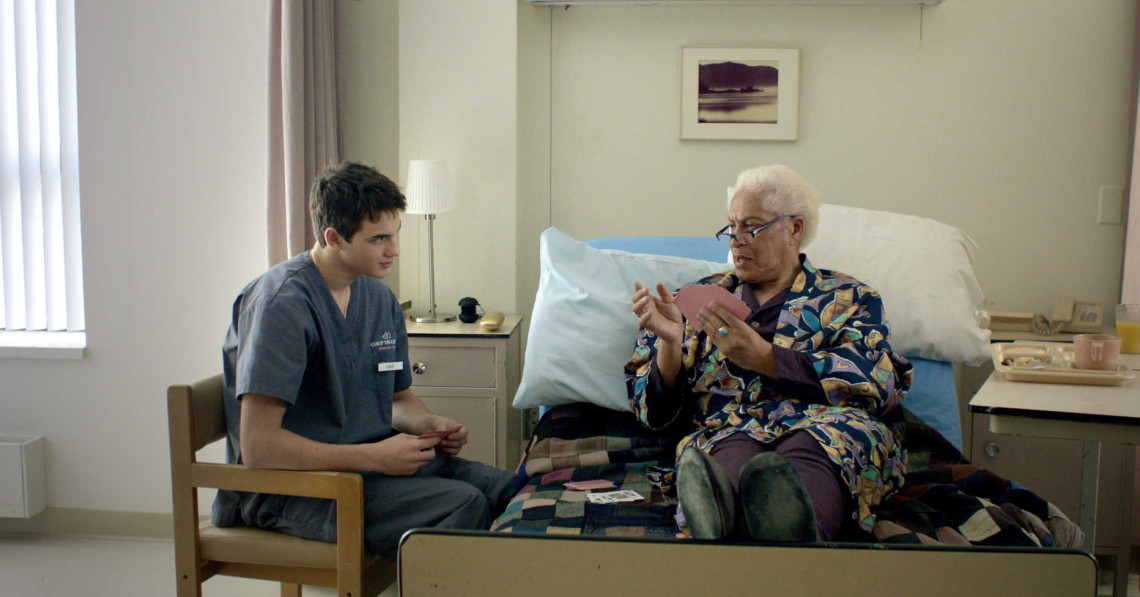The two closest points of reference for Gerontophilia, Canadian indie stalwart Bruce LaBruce’s latest, happen to be Xavier Dolan and Gregg Araki — though it’s not because of the gayness. While all three auteurs gravitate towards stories of love and loss with a queer cast of players, they’ve got more in common than non-heterosexual orientations. Gerontophilia shares Araki’s and Dolan’s flair for expressing the CinemaScope-scale melodrama of teen angst, distinctly indie languid pacing, and influence-obsessed pop sensibility. (The film begins with a young woman rattling off a list of feminist “revolutionaries” through gasped breaths during a heavy makeout sesh. The list includes everyone from Aileen Wuornos to Kim Gordon to Winona Ryder, because “shoplifting is always a revolutionary act.” Teens, am I right?) LaBruce’s biggest influence in Gerontophilia isn’t even LaBruce. Gone are the swatches of hardcore gay pornography that have heretofore peppered his filmography. In toning his transgressive streak down, he ends up with a film that feels a little like a diluted version of someone else’s work.
Though he doesn’t tone it too far down. In case you haven’t yet pushed “gerontophilia” through dictionary.com, let me save you a few keystrokes: it’s an old-people fetish. LaBruce never met a social norm he couldn’t test, and he mines a surprisingly novel taboo for his most recent effort. Unnaturally pretty francophone Lake (Pier-Gabriel Lajoie) has it bad for the elderly, a suspicion he first confronts after popping a boner while performing mouth-to-mouth on a drowning geezer in an early scene. He can’t pinpoint what draws him so inexorably towards men of a certain age, though LaBruce hints that an absentee father may have something to do with it. Like all teens grappling with confusing new sexual feelings, he’s both excited and frightened. He too-eagerly offers to help his mother out part-time at her job in an assisted care facility, and it’s love at first sight when he first lays eyes on greying resident Mr. Peabody (Walter Borden).
Let’s put those Harold and Maude comparisons away right off the bat; the two films overlap minimally beyond of the bare bones of their shared premise. LaBruce would rather explore the April-late December relationship as a stand-in for queer love. He challenges the audience’s knee-jerk revulsion at this perversion of the natural order (is it still pedophilia if the younger party seems really, really into it?) at every opportunity, finding earnest intimacy between this unlikely pair. When Lane doubly comes out to his closest confidante and kinda-girlfriend (Katie Boland), she registers far more shock at his taste for men of a certain age than his taste for men, period. LaBruce asks a difficult question, whether this form of unorthodox love is truly any different than queer love, now well along the road to mainstream acceptance. LaBruce captures moments of affection between Lane and Mr. Peabody too transcendently pure to be wrong.
Even so, LaBruce’s grasp occasionally exceeds his reach. He overextends his directorial capabilities in his pursuit of a more polished style, and the resulting self-seriousness can veer into total silliness. To wit: Our hero loses himself in the throes of divine ecstasy as he sponge-bathes Mr. Peabody for the first time. LaBruce lingers on sensuous shots of dirty water cascading over Mr. Peabody’s papery skin while cross-cutting between reaction shots of Lane, who appears to reach a sustained orgasm for the entirety of the sponging. It’s kind of beautiful at first, then it becomes weird, then it becomes goofy.
Tonally, LaBruce strings himself a perilous tightrope to walk. He captures the heightened dramatics of adolescence, where every unrequited crush might as well be the opening salvo of the apocalypse. But his balance falters a few times too many, and he falls into overstylized mush. He’s got some nice additional elements for support: his needle-drop of Crystal Castles’ fragile, gorgeous “Child I Will Hurt You” hits like a narcotic rush, and some technically impressive camerawork never hurts his cause. Even so, there’s something lacking at Gerontophilia’s core. It’s not that films like Mommy and Totally Fucked Up and Mysterious Skin render a softened LaBruce irrelevant. They just highlight this film’s room for improvement.




















